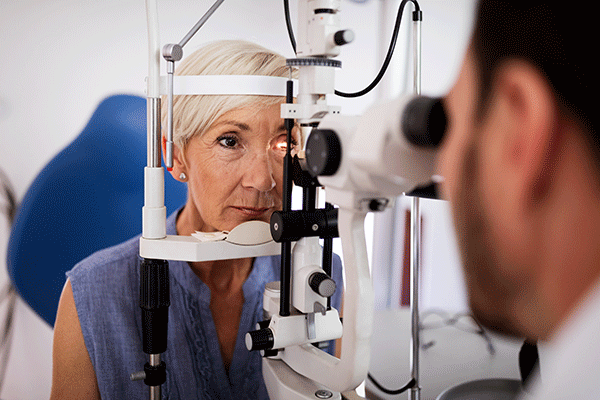Getting into the older years means many changes to our bodies, including our eyes. The health of our eyes and their accompanying vision must be protected at all costs as we approach our 50s. This is particularly crucial with the increased risk of developing age-related eye conditions, which require proactive strategies to maintain clear vision.
This blog will list seven important tips for navigating eye health in your 50s, ensuring a vibrant and visually active life to enjoy for years to come.
1. Regular Eye Exams
Regardless of age, regular eye exams are a sustainable and easily accessible means of maintaining your health. However, entering your 50s means that you must follow this practice dutifully as these eye exams can detect early signs of numerous age-related conditions.
Common eye concerns that develop and are diagnosed in your 50s are:
- Macular degeneration
- Cataracts
- Glaucoma
- Diabetic retinopathy
- Amblyopia
- Strabismus
Beyond early detection and intervention of these conditions, regular eye exams also provide the opportunity to update prescriptions. Altogether, these benefits work to slow the progression of many eye conditions, preserving your vision for years to come.
Arrange your eye check-up with 1001 Optometry if you’re ready to put your vision first!
2. Maintain a Healthy Diet
Surprisingly, a significant amount of your eye health relies on the nutrition you put into your body. This is true even during your 50s, when your body needs a more balanced diet more than ever. Antioxidants, omega-3 fatty acids, and common vitamins and minerals are all needed to maintain the health of your eyes. This nutrition also prevents dry eyes and reduces the chance of developing macular degeneration.
The best foods for your eye health are:
- Leafy greens
- Salmon
- Tuna
- Carrots
- Berries
Keeping your diet well-rounded will not just improve your overall health, but also shore up your eye’s resilience against age-related changes.
3. Manage Chronic Conditions
For those dealing with existing chronic conditions, it’s important to know that eye health can be greatly impacted by them without proper care. Hypertension and diabetes are common examples of conditions that those in their 50s have to effectively take care of through lifestyle changes, medication, and regular medical check-ups to prevent eye conditions.
For example, the elevated blood sugar levels associated with diabetes can lead to diabetic retinopathy if not managed properly. This condition affects the blood vessels in the retina, leading to difficulties with your vision. By taking care of chronic conditions such as this, you can significantly reduce the risk of developing further complications that may affect your vision.
4. Protect Your Eyes from UV Rays
It may be a simple solution, but protecting your eyes from UV rays can significantly reduce the risk of developing cataracts and other eye conditions. If you’re in your 50s and have yet to start investing in sufficient outdoor eye protection, it’s crucial to begin now.
High-quality sunglasses that block both UVA and UVB rays are one of the best forms of protection. Otherwise, wide-brimmed hats can also provide sufficient shade that blocks out harmful UV rays. Such simple additions to your everyday wardrobe can go a long way in protecting your eyes from the detrimental effects of ultraviolet radiation.
5. Practice Good Digital Eye Health
Technology has become a prominent part of everyday life, but it can strain the health of your eyes, especially as you get older. Continuous usage of screens can lead to digital eye strain, which causes blurred vision, dry eyes, and headaches.
The best way to prevent this strain even with regular screen time is by following the 20-20-20 rule. Every 20 minutes, take a 20 second break and look at something 20 feet away. You can also help your eye health by keeping the brightness and contrast of your screen low, positioning it at eye level, and using eye drops to keep your eyes moist.
6. Stay Active
Surprisingly, regular exercise does not just strengthen your physical well-being, but can also offer the benefit of maintaining optimal eye health. This is because physical activity helps to regulate blood flow to the eyes, reducing the risk of conditions such as glaucoma. Exercise is also useful in managing chronic conditions like hypertension and diabetes, which, as mentioned previously, can affect eye health.
In your 50s, try to attempt 150 minutes of exercise that elevates the blood flow per week. There are plenty of sports you can take up later in life, which have the added benefit of introducing you to new communities and overall fun. Altogether, though, these sports will promote both your cardiovascular and ocular well-being for a refreshed and healthy lifestyle.
7. Prioritise Sleep
In the later years of life, it’s crucial that you are getting enough quality sleep every night. Sufficient hours of deep sleep not only boost your overall health but also the well-being of your eyes. Without enough sleep, you can develop eye strain, dry eyes, and more severe conditions such as glaucoma.
To ensure that you’re getting enough sleep, maintain a consistent sleep schedule, practise good sleep hygiene, and facilitate a conducive sleep environment. If you set yourself up for success, you’re supporting the health and function of your eyes.
Conclusion
Your eye health requires a proactive and holistic approach by the time you reach your 50s. While it’s best to start protecting your health earlier, there are plenty of methods you can use to maintain it in your later years, as shown by the tips laid out in this article. Follow beneficial health habits and block out damaging environmental factors to reduce the risk of age-related and external eye conditions. Remember, the eyes are windows to the soul, and with proper care, you can enjoy clear and vibrant vision well into your golden years.




